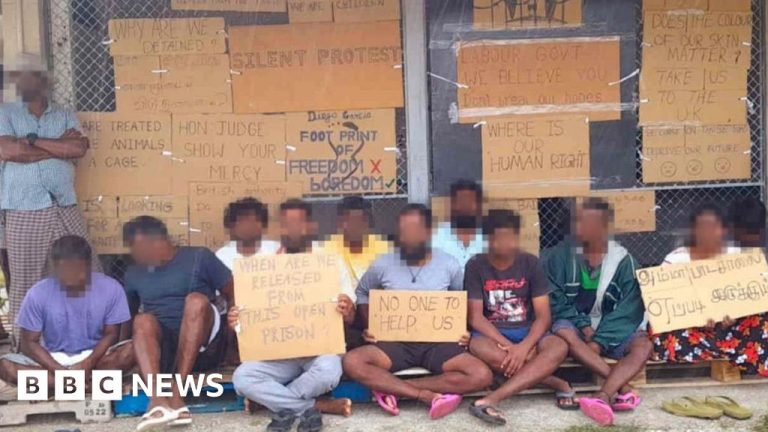Sri Lankan Tamil migrants were illegally detained for years in the isolated British territory of Diego Garcia, a judge has ruled.
In 2021, dozens of Tamils became the first to seek asylum on the Indian Ocean island, which is home to a secret UK-US military base.
They were held for years in a small, fenced-in camp, before being brought to the UK earlier this month in what the government described as a “one-off” measure in the interests of their welfare.
A British government spokesperson said it was “carefully studying” Monday's ruling.
Diego Garcia was never a “suitable long-term place for migrants” and the government “inherited a deeply troubling situation that remained unresolved under the last administration for years,” the spokesperson added .
Lawyer Simon Robinson of the British law firm Duncan Lewis, who represents some migrants, said “questions need to be answered about how, in the 21st century, this could have happened.”
The decision follows a historic hearing held in a converted chapel on the island in September. The BBC was granted unprecedented access to the island and migrant camp to cover the proceedings.
Diego Garcia is part of the Chagos Islands, or British Indian Ocean Territory (Biot), an area described as being “constitutionally distinct” from the United Kingdom. It is administered from London by a commissioner based at the Foreign Office.
During their stay on the island, the Tamils, including 16 children, were housed in military tents in the fenced camp, permanently guarded by the private security company G4S.
Tamils described their time on the island as “hell”.
“It's like an open-air prison: we weren't allowed out, we just lived in a fence and a tent,” one woman told the BBC after being brought to the UK with her husband and two children this month.
During a visit to the camp in September, the court found tears in some tents and rats nesting on top of the military cots the migrants had been given as beds.
There were multiple hunger strikes and numerous incidents of self-harm and suicide attempts in response to conditions in the camp, after which some people were transferred to Rwanda for medical treatment.
There have also been cases and allegations of sexual assault and harassment within the camp by other migrants, including against children.
Margaret Obi, an acting judge at the Biot Supreme Court, said in her ruling Monday that the camp was a prison “in all but name” and “had been a prison from the beginning.”
She found that a former deputy commissioner “appeared to have only a limited appreciation of the fundamental importance of freedom.”
Tom Short, a lawyer at law firm Leigh Day, said the judgment was “not only a defense of the rights of our clients, but also a triumph for the rule of law in the British Overseas Territories”.
“Such an affront to fundamental rights should never have happened and, when the time comes, this travesty of an administration will have to be examined in its entirety,” he added.
The camp is now closed, but two men with criminal convictions and another under investigation remain on Diego Garcia, according to the BBC.
Britain took control of the Chagos Islands from its then colony, Mauritius, in 1965 and later expelled its population of more than 1,000 to make way for the base.
The ruling comes after the UK agreed earlier this year to cede the islands to Mauritius, a historic decision.
Under the terms of the agreement, which has not yet been signed, Diego Garcia would continue to operate as an Anglo-American military base, but Mauritius would assume responsibility for any future migrant arrivals.

